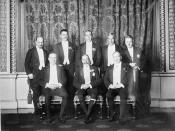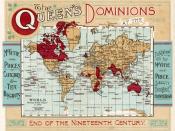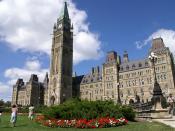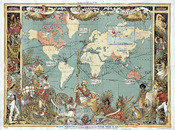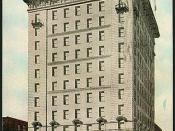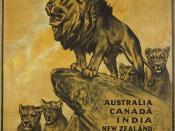There have been many stepping stones, which have aided in the independence of nations. One of the most relevant, was that of Canada's gaining independence from Britain, as a defining moment in history. There are three very important events that guided Canada to independence from Britain. They are the Balfour Declaration in 1926, the Statute of Westminster in 1931, and the Canadian Constitution in 1982. These three events over the century have caused Canada to become more independent and govern itself.
The Balfour Declaration was the first step towards Canada's independence from the British Empire. Before 1926, all of the colonies under the British Empire had practically no control over themselves. Britain controlled most of their internal and external affairs. Arthur Balfour said that Britain controlling all of the colonies would not work in the long run, so Balfour wrote a report stating that the Dominions of Britain should be self-governing and equal with each other and England.
Balfour stated that, "Equality of status, so far as Britain and the Dominions are concerned, is thus the root principle governing our Inter-Imperial Relations"ÃÂ ("Balfour Declaration"ÃÂ). Balfour created this report in 1926 and presented it at the Imperial Conference. The report was approved and all of the colonies of Britain were now self-governing. The effects of the report were, Britain could not make a law for a Dominion without that Dominion's government consent. Also, the Dominion's parliaments could pass legislation with British legislation. The Balfour report also stated, "It is the right of the Government of each Dominion to advise the crown on all matters relating to its own affairs"ÃÂ ("Balfour Declaration"ÃÂ). With this report passed, Canada and all of the Dominions of Britain became self-governing and more independent in their country's affairs.
The Statute of Westminster was the second step towards Canada's independence from the British Empire. In 1931, the Statute of Westminster was created giving all of the British Dominions control over their relations and external affairs with other countries. Before this, the British Empire had all control over foreign and military policies having to do with Canada. The Statute of Westminster was Canada's, "Declaration of Independence"ÃÂ (Sramek). Canada was free to make any decisions on foreign affairs without having to ask Britain for permission. In 1926, Arthur Balfour redefined Great Britain and the Dominion as: "Autonomous communities within the British Empire, equal in status, in no way subordinate one to another in any aspect of their domestic and external affairs, though united by a common allegiance to the Crown, and freely associated as members of the British Commonwealth of Nations."ÃÂ (Sramek) Five years later, this statement was translated into the Statute of Westminster and Canada finally had its declaration of independence.
The Canadian Constitution was the last and final step towards Canada's independence from Britain. Prime Minister Pierre Trudeau wanted to repatriate Canada's Constitution, which was the British North America Act because it had served Canada for over a century and it remained under the jurisdiction of the British Parliament. Trudeau attempted to do so but he failed because the provinces could not all agree on an amending formula. "Canada was intended to be a strong federal state, but crucial early cases acknowledged greater provincial powers"ÃÂ (Henderson). Trudeau was very determined to change the Constitution and add a written charter of rights and freedoms. In September 1980, Trudeau proposed the changes in a meeting with all of the premiers, but only two provinces, New Brunswick and Ontario agreed with the changes. On November 5th 1981, Prime Minister Trudeau and the provincial premiers, excluding Quebec, met together one last time and made a last-minute compromise proposal. It was decided that, "all future amendment must be done within Canada"ÃÂ (Henderson). Canada, then formally asked Britain to pass the requested legislation. Britain passed the legislation and finally on April 17, 1982, Queen Elizabeth II signed the Constitution. The new Canadian Constitution was now complete with an amending formula, new Charter of Rights and Freedoms and a bill of rights. This final movement led to Canada's independence from the British Empire.
Throughout the century, Canada had gained independence from Britain, which is a very important defining moment. Canada has gained independence through the Balfour Declaration in 1926, the Statute of Westminster in 1931, and the Canadian Constitution in 1982. At one point, it must have been hard for Canadians to believe that one day they may be free from Britain's control, but over a very long period of time it finally happened. Canada still respects Britain to this day but it is in full control of all its affairs. All these events have aided Canada in becoming a more self-governing, independent nation.
